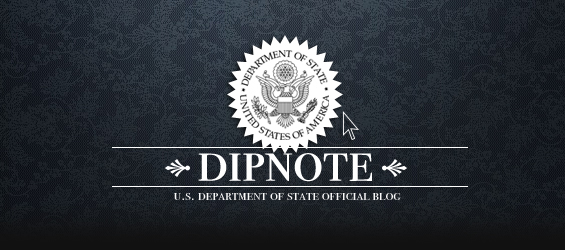Posted by Michael Kozak on Jan 29, 2013 - 07:51 AM
![Memorial candles are lit in front of a photo taken during WWII showing refugees fleeing from the Nazis at a ceremony marking International Holocaust Remembrance Day in Russia's first Jewish Museum in Moscow, Russia, Jan. 27, 2013. [AP Photo]](https://webarchive.library.unt.edu/web/20130303224740im_/http://blogs.state.gov/images/Dipnote/behind_the_scenes/2013_0129_holocaust_m.jpg)
On January 28, the State Department marked International Holocaust Remembrance Day by inviting foreign diplomats, NGO representatives, academics, and others to view the documentary and participate in a discussion.
In welcoming everyone to the event, Under Secretary Maria Otero noted, "Today is an important occasion. Each year we gather together to commemorate the victims of one of the worst tragedies in human history. Indeed, almost 70 years after the end of World War Two, we continue to honor those whose lives were brutally taken during the Holocaust because they were Jewish, Roma, or from some other group targeted by the Nazis."
I reflected on my tenure as the U.S. Ambassador to Belarus, where I saw how the legacy of this abomination still affects the entire population. It is part of the everyday experience of people living there. You do not need to go to a death camp to be confronted with the evidence of mass murder. Rather, you drive or walk past a depression in the earth and someone will say, "Oh, that is where they killed my grandparents." Before the war, large Jewish populations lived in Minsk and other cities in Belarus. They were even the majority in some cases. After the war, all but a handful of the Belarusian Jews were dead. The story was similar in the Baltics and Ukraine and in parts of the Russian Federation, all of which struggle to cope with the lasting impact this genocide has had on their communities, cultures, politics, and economies.
U.S. Special Envoy for Holocaust Issues Douglas Davidson moderated a panel discussion on reinvigorating efforts to memorialize the horrors of the Holocaust as a means to prevent such atrocities in the future. French Roman Catholic priest Father Patrick Desbois of Yahad-In Unum, described in detail the work of his organization (whose name is derived from the Hebrew and Latin words for unity) to systematically identify and document every mass execution site during World War II and, "to irrevocably refute the Holocaust deniers of today and tomorrow, to serve as a permanent warning to humanity of the dangers of genocide and to allow for the respectful remembrance of the fallen."
One of the great tragedies of the Holocaust is that the message "Never Again" was unfortunately not heeded in many parts of the world in the latter half of the 20th century. Taking active measures to make "never again" a reality, President Obama has created the Atrocities Prevention Board (APB), which helps the U.S. government identify and address atrocity threats, thus making the prevention of atrocities a key focus of this Administration's foreign policy. As the increasingly-connected international community moves into the 21st century, we must all redouble our efforts. Through such entities as the Atrocities Prevention Board, we can ensure mass murder, such as that which occurred during the Holocaust, is never repeated. We all have the power to be agents of future positive change.
Follow Entry's Comments Via RSS
Do you want to know when a comment is added to this entry? Stay up-to-date:
Subscribe to this entry's comments via RSS.

Comments
Molly in Maryland writes:
We must never forget.
Posted on Wed Jan 30, 2013
We must never forget.
Posted on Wed Jan 30, 2013
Susan C. in Florida writes:
That there are countries that still deny the holocaust is beyond belief or understanding. Today we must embrace "never again" for all nations. We must recognize that terrible atrocities are happening all around the world. In Mexico, in Syria, in many African nations,and yes, even in our country as we face the shame of human trafficking. Let us say "no more" to the abuse and murder of other human beings regardless of where they live or what their beliefs may be. Let us truly honor those who have suffered and died at the hands of "mad" men and work to end these unspeakable crimes against humanity.
Posted on Wed Jan 30, 2013
That there are countries that still deny the holocaust is beyond belief or understanding. Today we must embrace "never again" for all nations. We must recognize that terrible atrocities are happening all around the world. In Mexico, in Syria, in many African nations,and yes, even in our country as we face the shame of human trafficking. Let us say "no more" to the abuse and murder of other human beings regardless of where they live or what their beliefs may be. Let us truly honor those who have suffered and died at the hands of "mad" men and work to end these unspeakable crimes against humanity.
Posted on Wed Jan 30, 2013
Page 1 of 1 pages


